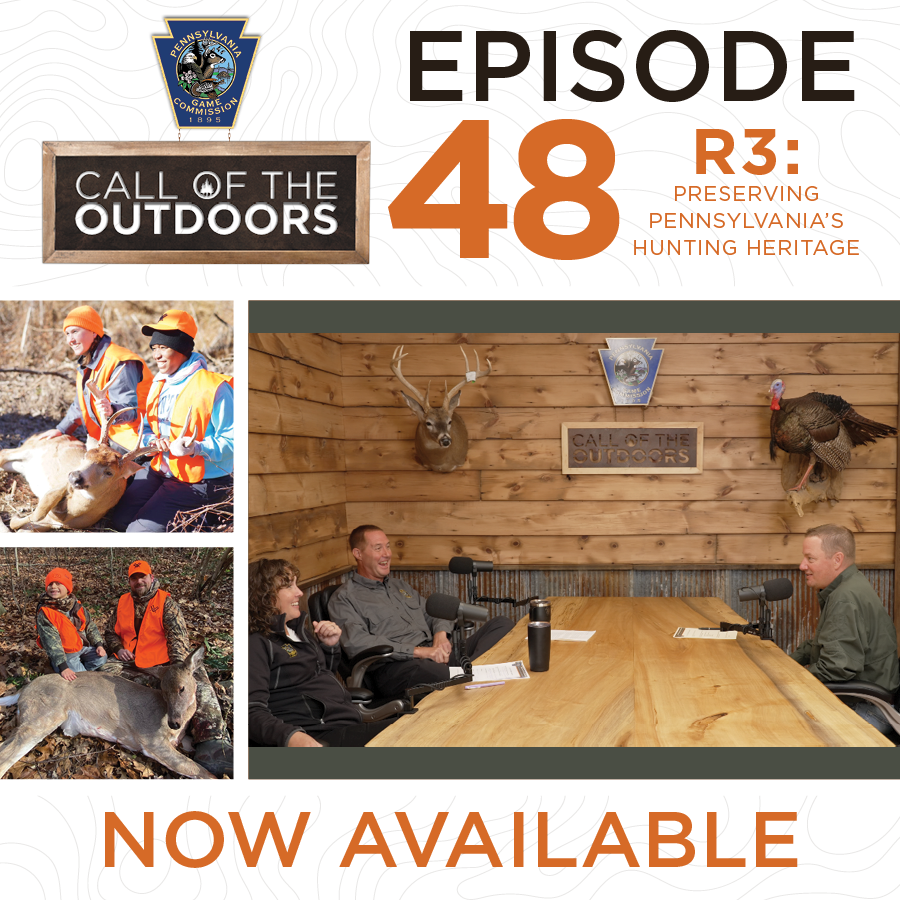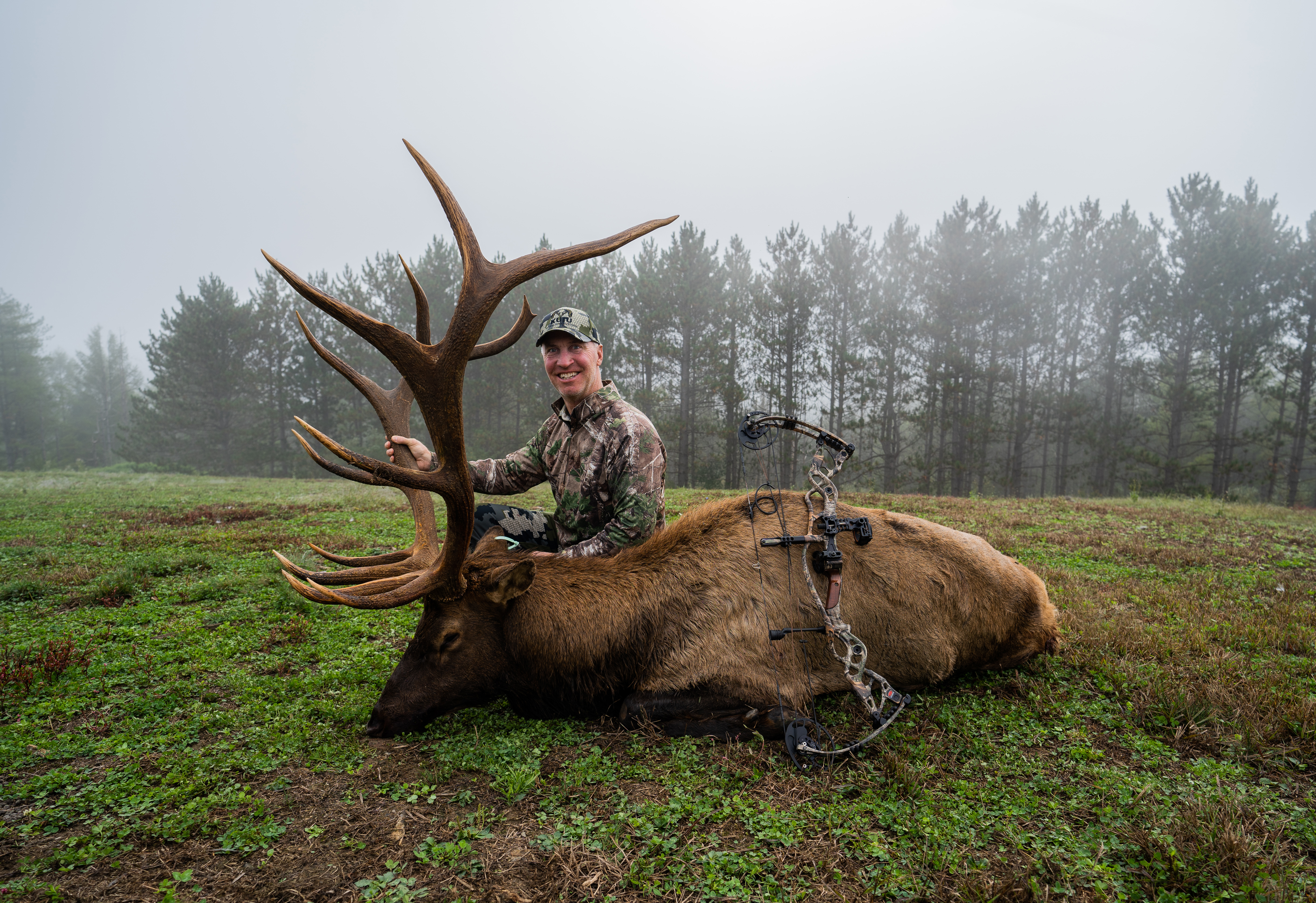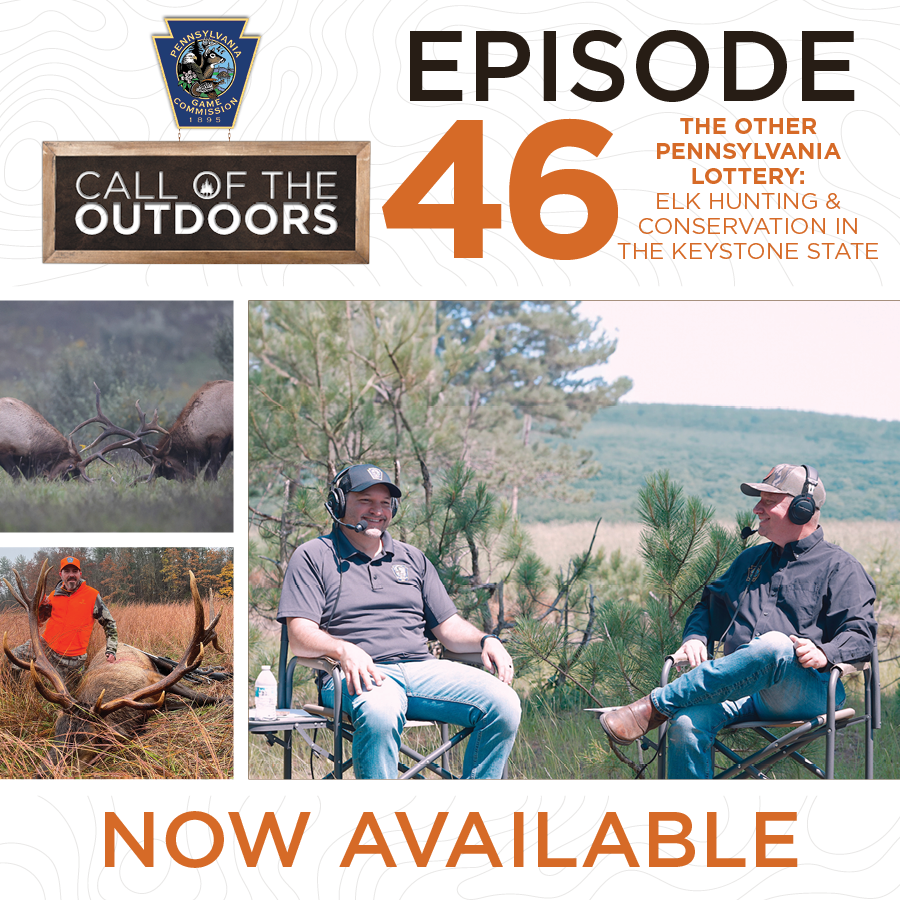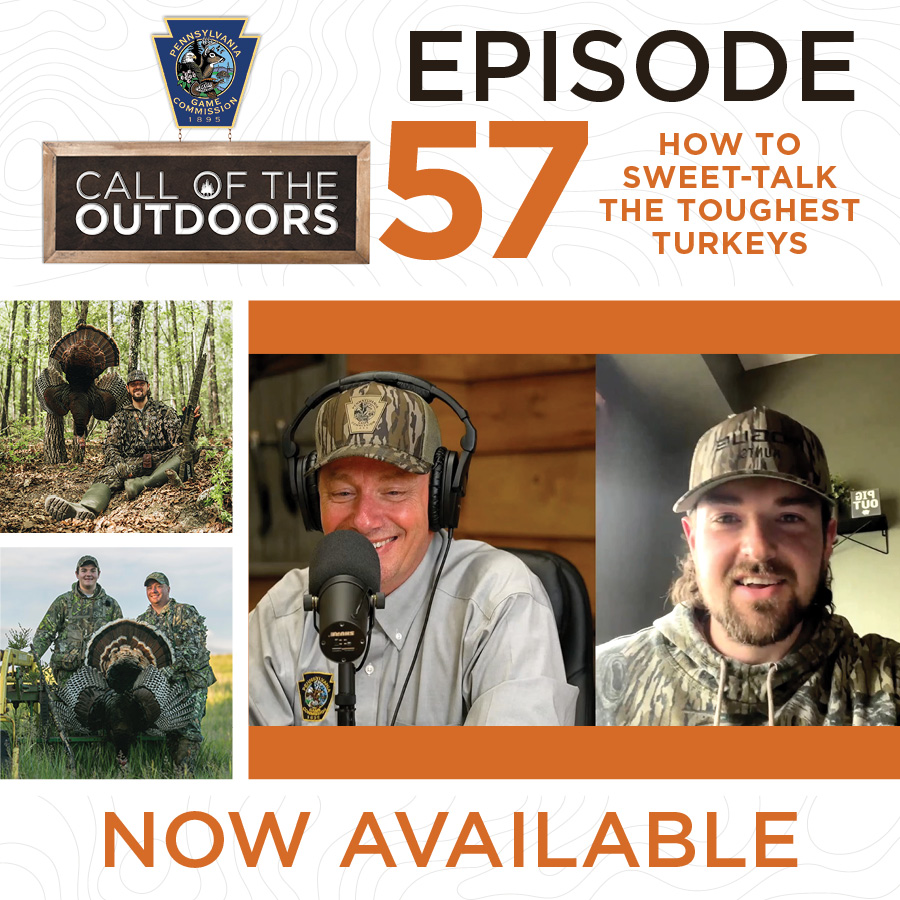Episode Transcript
[00:00:18] Speaker A: Lift your feet up the way you put your feet down. I mean, there's all kinds of stuff.
[00:00:21] Speaker B: And he opened it up. Let's go. So he was fired up. So I was really thrilled to see.
[00:00:27] Speaker C: That whenever Chris harvested that deer and he only had his bicycle.
[00:00:32] Speaker A: Hello and welcome to call of the outdoors, the podcast of the Pennsylvania Game commission.
Fall is in the air. September is here, and hunting season is just on the cusp. And, you know, lots of things that happen here in September, and we're all getting excited about it. And we have a real special program today. We're going to talk about our three recruitment, retention, and reactivation of hunters. And it's just such an important topic, and it's so important to us as outdoorsmen and conservationists to pass it down to the next generation. And joining us today are Courtney Lacivita. She's the division chief of hunter Trapper education and outreach, which is our three reals. And from middle creek, we have Brian Collett. And Brian is a transplant working here at the game commission now that came from Ohio. And he wants to talk about a lot of the opportunities and a lot of differences that he had to change when he moved over here to Pennsylvania. And he was very welcome with the amount of public land that we had here in this state. But I want everybody to do one thing. I want you to close your eyes and think about that first time you went to the woods, or that first squirrel or that first deer and just, or the first turkey, and just the memories that were created in the ignition, the fire that got started to make you a hunter and a conservationist. And I challenge everybody this fall to introduce one new person to the outdoors. Whether it's hunting, trapping, fishing, or just going out there and seeing wild animals, we can introduce somebody new every year. We're doing our job to leave it better than we found it.
For Pennsylvania hunters and conservationists, our roots run deep. The episodes we bring to you on the Pennsylvania Game Commission's podcast, Call of the outdoors, will take a deep dive into exploring, exposing the incredible work being done by agency staff and partners, including statewide habitat projects, the science behind wildlife management, and what drives agency decisions. The Pennsylvania Game Commission's mission is twofold, to manage and protect wildlife and their habitats for not only current, but future generations, and to promote hunting and trapping in the Keystone state.
Well, good morning.
[00:02:39] Speaker B: Good morning.
[00:02:39] Speaker A: Welcome to the new set of call the outdoors. And what a awesome subject to talk about today. And that's our three reals in, you know, September. We're sitting here in September.
You can kind of feel the hint in the air. Hunting season's here. And, I mean, it gave me goosebumps to say that. But, Courtney, go ahead and tell us, you know, a little bit about yourself and how and why you're here at the game commission.
[00:03:01] Speaker C: So my name is Courtney Lacivita. I am the hunter education and outreach division chief. And that's just outreach is kind of a fancy name for r three, which we're going to talk about a little bit today.
And I work for the Pennsylvania Game Commission because I am very passionate about connecting people to the outdoors. And what better place to do that than at the game commission?
[00:03:20] Speaker A: Heck, yeah. And you've had many roles here, you know, in your career, and so, you know, talk a little bit about that. You know, once you came into the agency, you know, you were at Kika for a while, and you bring a lot of, a lot of positive energy to the game commission, for sure.
[00:03:35] Speaker C: So I did start out at the, once I graduated college, I started out the Keystone Elk Country Alliance. I worked as the conservation education department head, so I oversaw all the education there. And then I came to the Pennsylvania Game Commission as the chronic wasting disease communication specialist. I did that for a couple years, and then I was fortunate enough to land a position with Matt as a social media specialist. So I ran social media for two years, roughly, and then this position came open as a division chief for hunter education in three reals. And I've always kind of just had that desire to help people get connected, like I said, to nature and outdoors, and it just seemed like a good fit. So here I am.
[00:04:18] Speaker A: You know, Courtney's a hard charger. She's out there all the time and in front of people, and you can tell your passion for conservation every day. I mean, not just, you know, behind the doors, but outside. No matter where you go, you're always putting the best foot forward to conservation, and we're lucky to have you. And, Brian, you're a transplant, right?
[00:04:36] Speaker B: I am. I am. I am not a Pennsylvania native transplant from the Buckeye state, but we are.
[00:04:43] Speaker A: Just so, you know, we are Penn State.
[00:04:45] Speaker C: Thank you.
[00:04:48] Speaker B: We have the Ohio State University.
But, yeah, I am an environmental education specialist. I work out of the middle Creek visitor center. And, you know, I was a teacher for several years. And once I moved out here, I had doing a lot of substituting things of that sort, looking for a job. And this opportunity popped up, and I thought, what better opportunity than to be able to put my career choice and kind of marry it with what I kind of spent all my free time doing, which was outdoor stuff. So, you know, I've been a lifelong outdoorsman, hunter and fishermanden, and I really enjoy the opportunity to not only work with really people of all ages, we get a tremendous amount of school kids that visit middle Creek, but the outdoors I'm very passionate about. So to get to discuss and teach people about it is really a perfect fit for me.
[00:05:48] Speaker A: Well, we're glad to have you. And Middle Creek sees so many people. But I do want you to tell the folks out there tuning in what your favorite thing is to hunt a. Oh, turkeys. Attaboy.
[00:05:56] Speaker B: Hands down.
[00:05:57] Speaker A: Attaboy.
So, Courtney, you know, let's dive in a little bit and just talk about what is r three? And, you know, it's a term that's been around for a while and just everybody needs to take it to heart and kind of talk about what it is.
[00:06:12] Speaker C: Yeah, of course. So r three is actually a national movement that started in the 1980s.
It's surprising because a lot of people don't know what it is, but kind of like one of those, like, secret that are within a lot of state agencies.
[00:06:25] Speaker A: No one even born in the US were you?
[00:06:28] Speaker C: No.
So, you know, it's something like we know internally, but I don't know that, you know, the public knows about it that much. But it is a national movement that was started to reverse the negative trend of hunting participation across the nation. So at that point in time, they're kind of starting to see this steady decline in hunting participation, which at that point in time was really scary for a lot of state agencies because hunting through either hunting license sales itself or through Pittman Robertson funds were really heavily funding state wildlife agencies and the wildlife conservation work that they were doing.
I would say that it's been some time now, and I would say that r three has kind of evolved over time. So now especially, let's just. I can't speak for other states. Right. I'm not working in other states. But here in Pennsylvania, we're really fortunate. The last couple of years, we have had insane natural resource sales, and we are one of the states that are still fortunate in. Yeah, we do see some decline of hunting license sales, but we're still holding strong as one of the states that sell the most licenses every year. And if you're looking at, you know, percentage of land to the amount of people we have, we're really far up there. So we're pretty fortunate. So the funding itself is still important for Pennsylvania. I would say in 20, 23 24 physical year, our hunting license sales and with Pittman Roberson, probably made up a third of our funding. But to say it's, like, the sole source for us, that would probably be a little bit of a lie. So I would say for us, it's about, um, really creating an environment where every Pennsylvania resident feels like if you have an interest in hunting or if you have an interest in recreational shooting, if you have an interest in trapping, that we're here to support you and we want to help you get out there. And it's. It's more about kind of preserving, um, this outdoor recreation life that we have here in Pennsylvania.
[00:08:34] Speaker A: You know, when we look at license sales. I'll just, you know, to recap, 2019 through present, you know, we saw a pretty good decline. It was falling. You know, I think it was 2012 when it really started. You know, we're losing like, four, almost 5% a year, something like that. Don't quote me on those numbers. But in 2019, we kind of leveled that and actually seen a slight increase, you know, over the last three or four years. And that's positive news. It is. When you look at it. You know, we had, you know, in the eighties, you know, those years, we sold 1.2 million licenses. We're so lucky to have that heritage here in Pennsylvania. And that's why r three is so important to our state, because we have to introduce young folks or new folks to hunting, because hunters are the first line when it comes to conservation. And we not only fund conservation and wildlife, but also are the first tool for management of those game species. And I think it's so important, and I'm excited. I've been excited for this r three podcast forever because it's close to my heart.
And that's where the next question is going to come back to you, too. Why is three reals so important?
[00:09:38] Speaker C: I think you're kind of talking about, like, preserving heritage, right? And so part of that's a big thing, right, if we continue to just allow our hunting numbers, trapping numbers, shooting, recreational shooters, although recreational shooters are going way up to just decline, and we don't really try and preserve that, you're not just losing a hunting license sale, right. You're not just losing that. You're losing that heritage. It's kind of like that tradition is not that culture. Tradition isn't being passed down. And as you get fewer and fewer, you're just going to see less and less, and it's going to. I would never believe that hunting will cease to exist. I don't think that's going to be a thing, especially in Pennsylvania. I feel like we have. It is just too ingrained in our culture. I don't think it will ever cease to exist. But that support for hunting, that support for trapping, the support for shooting, those type of things, that's what could potentially dwindle if we don't actively fight it, so.
[00:10:34] Speaker A: Yeah, exactly. If they're guys like Brian and I, if there's one turkey left, we're going to hunt them next week, right?
[00:10:40] Speaker B: Absolutely. Yeah. I mean, that's, you know, and I know that's something that it was very important to me with. I have a couple little boys that are, you know, I got one that's been hunting now for a couple seasons. I got another one that he got his first hunting license this year. I let it come in the mail, and I was like, quinn, you got a letter. And he opened it up and he was like, let's go. So he was fired up. So I was really thrilled to see that. So. But it was really important to me to pass that on to them, you know, something that I'm so passionate about. And they have other things, you know, they love to play baseball and they love to do, you know, they have lots of things they love to do, but that's something that, you know, slowly but surely instilling my passion for that into them, and you see it building in them as we move forward. So, you know, that's an important thing for me to have passed on to them. And actually my wife, who is a new hunter, so it's been exciting to kind of see them grow in that realm.
[00:11:41] Speaker A: We're going to talk about the girls here in a minute because that's, you know, that's a, that's when you look at the fastest growing aspect of our sport, female participants. And whether it's wives or girlfriends or nieces, it doesn't matter. I mean it. And here's what I always say about girls. They're better hunters than we are. They're more patient. They shoot better than us. We just did a range event last week with a young lady that never shot a crossbow in her life and loaded it up, and a bunch of the guys shot, and she went up there and just dead centered it, you know? Cause they listen and squeeze the trigger and the bullet or the bolt goes or the arrow goes exactly where it's supposed to. They kind of have an advantage. You girls are way better shots than we are, for sure.
[00:12:20] Speaker B: Oh, I see that. I see that in our archery events that we hold at Middle Creek, I've had more than a few people anymore that they came there and they're shooting and they're shooting really well. And I often try to say something like, gosh, you keep shooting like this, you're going to have to take up deer hunting. And I've had more than a few that are said, well, you know, I've really thought about it. It's a great opportunity. Even though, you know, we're just there shooting bows.
If they get confident with doing that, then the next step might be, well, maybe we'll go try and hunt some deer with this.
[00:12:54] Speaker A: I've watched that even in our NASP tournaments. We just did a podcast with Maddie up in the northeastern, our national champion, and I was watching her shoot. She's so disciplined and so methodical and so just perfect every time. She executes every shot, you know, and sometimes, like, I know when I'm shooting my bow, I'll shoot a couple times and then I start to lose my form and then arrows start going all over the place and you wonder why. But it's just that concentration level that.
[00:13:19] Speaker C: She has all the steps. Gotta remember all the steps.
[00:13:21] Speaker B: Makes a big difference, for sure. Yeah. You always see that, like at the Nash tournament, you see those kids that really embrace that and wow, they shoot just amazing.
[00:13:31] Speaker A: Oh, lights out. It's pretty awesome. Yeah. So when you here at the game commission, you know, what are we doing to help and create new hunters?
[00:13:38] Speaker C: Oh, so many things.
[00:13:39] Speaker A: I know, I know. There's a long list.
[00:13:42] Speaker C: There's a long list of things. So there's a few that I would like probably touch on more than others. But we have a lot of advanced hunter education programs. I don't think a lot of people actually know that we have those. But we do have a successful bow hunter course.
It is a, you can take it online or it is an in person course. I would highly recommend the in person one. If you're doing it, it's very hands on. You're going to learn how to use tree stand, you're going to shoot bow in class, all these different types of things, how to track a deer. We also have a successful furtaker course, which is also a more advanced, that is in person only.
In order to learn how to set traps, you kind of need to get your hands, hands on traps dirty. That is in person only important just.
[00:14:28] Speaker A: To know that it doesn't hurt that bad.
[00:14:29] Speaker C: Yeah, that's not. I'm telling you, my finger still hurts from the first time I got stuck in a trapden. Yeah. So we have the furtaker course as well. So we have some advanced hunter education programs. We have virtual learn to hunt program. It is a webinar series. We have done a program on squirrel, pheasant, turkey, deer, archery deer, rifle. And last year we did a three part waterfowl series.
We do have one that just happened in August 20 that was on dove. So if you missed that, you can also see that on our YouTube channel or go to our get started hunting page and you can find it there. All of these are available. The recordings of those webinars are available on our website, so anybody can check those out.
That is turning into an in person program. Everybody get really excited for me.
[00:15:19] Speaker A: Woo.
[00:15:20] Speaker C: So we are going to be start doing those one day as in person programs as well. But I would say, man, it's one of the biggest things that we do, at least that my team does. And Brian is a big help with this too. Are our mentored hunts?
[00:15:34] Speaker B: Yeah. Yeah. The menard hunts is really an excellent experience.
I just really enjoyed not only the hunting aspect of it, but just the getting to know the people and people that in some cases, I don't know, would have ever had the opportunity to even hunt or if it weren't for the menard hunt opportunities. So really enjoyed that aspect. And I'm always into teaching people about hunting or talking about hunting. And it's really exciting to see someone be successful at it.
And it's exciting to have those conversations with people about why we want to sit here and what we're looking for in those cases. Because that's the stuff that I feel like really will lead people to be successful as they move forward in their, in their hunting, is that understanding where you're hunting and then also all the stuff that comes along with it if you are successful, how to process a deer and all that stuff. So, yeah, I've really enjoyed that. And it's really very exciting to see kind of that spark build in people a little bit. I had one of the first guys I ever mentored.
I always think of this story because we were struggling. We had not seen many deer. And I know he wanted so badly to change blinds the one day. And I just loved the blind that we were hunting out of. And I was like, just stick it, let's stick it out one more night. One more night and then maybe we'll see about change. I said, I just really like the spot. And we talked about why I liked it and what we had going on there. And it was like almost dark that, that night, and I hadn't, we hadn't seen a deer. And I was like, come on, deer, help me out here a little bit. And then lo and behold, like, literally the, I mean, we were down to the wire and all of a sudden here comes a nice big doe and he made a great shot on her. And, you know, we were talking and looking over that deer and he was like, you know, I think I get what you mean by, you know, you just, you just got to stick it out for whatever reason. You know, obviously you like this spot, but, you know, sometimes it's, you know, it's all about just sticking with it and getting it done. And that's important for, for hunters to understand as well, right?
[00:18:01] Speaker A: The grass isn't always greener. You know, I'm just going to put this out there because I think it's important and I kind of challenge people that are, you know, out there. Number one is we all should try to pass it on somehow. Every year we should try to take somebody out there. Maybe not necessarily with a, with a bow or a gun, but maybe just go out there and let them see the woods. I remember if everybody would close their eyes and think back to the first time that you saw a boat.



